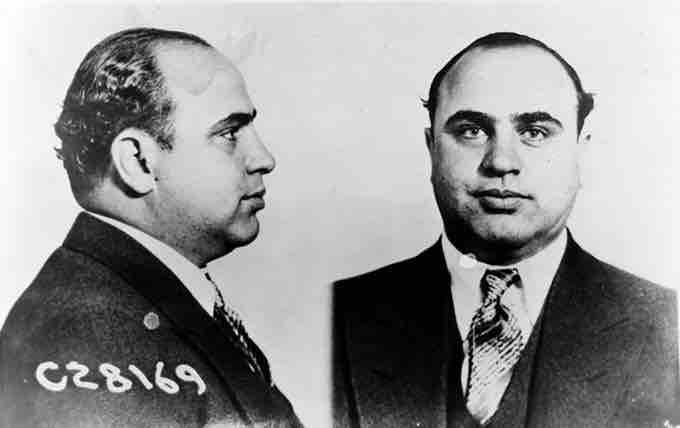Organized crime refers to transnational, national, or local groupings of highly centralized enterprises run by criminals for the purpose of engaging in illegal activity, most commonly for monetary profit. Sometimes criminal organizations force people to do business with them, as when a gang extorts money from shopkeepers for "protection." Gangs may become "disciplined" enough to be considered "organized." An organized gang or criminal set can also be referred to as a mob.
Patron-client networks are defined by the fluid interactions they produce. Organized crime groups operate as smaller units within the overall network, and as such tend towards valuing significant others, familiarity of social and economic environments, or tradition.
Some notable patron-client networks involve the Russian and Albanian mafias, the Japanese Yakuza, the Irish mob, and the Sicilian and Italian American Cosa Nostra (i.e. the Sicilian mafia).

Organized Crime
Al Capone is a name often associated with organized crime.
Bureaucratic and corporate organized crime groups are defined by the general rigidity of their internal structures. Focusing more on how the operations works, succeeds, sustains itself or avoids retribution, they are generally typified by: a complex authority structure; an extensive division of labor between classes and the organization; responsibilities carried out in an impersonal manner; and top-down communication and rule enforcement mechanisms.
A distinctive gang culture underpins many, but not all, organized groups; this may develop through recruiting strategies, social learning processes in the corrective system experienced by youth, family, or peer involvement in crime, and the coercive actions of criminal authority figures. The term "street gang" is commonly used interchangeably with "youth gang", referring to neighborhood or street-based youth groups that meet "gang" criteria.
Organized crime groups often victimize businesses through the use of extortion or theft and fraud activities like hijacking cargo trucks, robbing goods, committing bankruptcy fraud, insurance fraud, or stock fraud. Organized crime groups seek out corrupt public officials in executive, law enforcement, and judicial roles so that their activities can avoid, or at least receive early warnings about, investigation and prosecution.